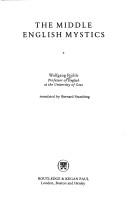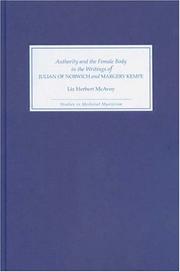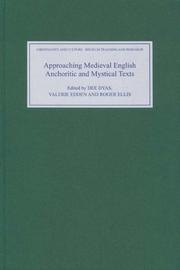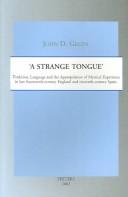| Listing 1 - 7 of 7 |
Sort by
|
Multi
ISBN: 9781843843405 9781782040897 Year: 2013 Publisher: Cambridge D.S. Brewer
Abstract | Keywords | Export | Availability | Bookmark
 Loading...
Loading...Choose an application
- Reference Manager
- EndNote
- RefWorks (Direct export to RefWorks)
248.2 <420> "04/14" --- Mysticism --- -Dark night of the soul --- Mystical theology --- Theology, Mystical --- Spiritual life --- Negative theology --- Mystieke theologie. Mystiek. Mysticisme--Engeland--Middeleeuwen --- History --- -Conferences - Meetings --- -Mystieke theologie. Mystiek. Mysticisme--Engeland--Middeleeuwen --- -248.2 <420> "04/14" Mystieke theologie. Mystiek. Mysticisme--Engeland--Middeleeuwen --- Dark night of the soul --- 248.2 <420> "04/14" Mystieke theologie. Mystiek. Mysticisme--Engeland--Middeleeuwen --- Christian spirituality --- anno 500-1499 --- Great Britain --- -Christian spirituality --- -248.2 <420> "04/14" --- -History --- -Mysticism
Book
ISBN: 0859913015 Year: 1990 Publisher: Suffolk (UK) : D. S. Brewer,
Abstract | Keywords | Export | Availability | Bookmark
 Loading...
Loading...Choose an application
- Reference Manager
- EndNote
- RefWorks (Direct export to RefWorks)
248.2 <420> "04/14" --- Christian literature, English (Middle) --- -Mysticism in literature --- Mysticism --- -Dark night of the soul --- Mystical theology --- Theology, Mystical --- Spiritual life --- Negative theology --- Mystieke theologie. Mystiek. Mysticisme--Engeland--Middeleeuwen --- History and criticism --- History --- -Langland, William --- Mysticism in literature. --- History and criticism. --- -Mystieke theologie. Mystiek. Mysticisme--Engeland--Middeleeuwen --- 248.2 <420> "04/14" Mystieke theologie. Mystiek. Mysticisme--Engeland--Middeleeuwen --- Mysticism in literature --- Langland, William,
Book
ISBN: 0859913465 Year: 1992
Abstract | Keywords | Export | Availability | Bookmark
 Loading...
Loading...Choose an application
- Reference Manager
- EndNote
- RefWorks (Direct export to RefWorks)
248.2 <420> "04/14" --- Mysticism --- -Mysticism --- -English literature --- -Mysticism in literature --- -British literature --- Inklings (Group of writers) --- Nonsense Club (Group of writers) --- Order of the Fancy (Group of writers) --- Dark night of the soul --- Mystical theology --- Theology, Mystical --- Spiritual life --- Negative theology --- Mystieke theologie. Mystiek. Mysticisme--Engeland--Middeleeuwen --- History --- -Congresses --- History and criticism --- Congresses --- England --- -Church history --- -Mystieke theologie. Mystiek. Mysticisme--Engeland--Middeleeuwen --- 248.2 <420> "04/14" Mystieke theologie. Mystiek. Mysticisme--Engeland--Middeleeuwen --- -Dark night of the soul --- English literature --- Mysticism in literature --- British literature --- History and criticism&delete& --- History&delete& --- Angleterre --- Anglii︠a︡ --- Inghilterra --- Engeland --- Inglaterra --- Anglija --- England and Wales --- Church history --- Congresses.

ISBN: 0710006128 9780710006127 Year: 1981 Publisher: London Routledge and Kegan Paul
Abstract | Keywords | Export | Availability | Bookmark
 Loading...
Loading...Choose an application
- Reference Manager
- EndNote
- RefWorks (Direct export to RefWorks)
Christian literature, English (Middle) --- English literature --- Figures of speech --- Metaphor --- Mysticism --- 248.2 <420> "04/14" --- 248 <420> "04/14" --- 248.2 <420> "04/14" Mystieke theologie. Mystiek. Mysticisme--Engeland--Middeleeuwen --- Mystieke theologie. Mystiek. Mysticisme--Engeland--Middeleeuwen --- Dark night of the soul --- Mystical theology --- Theology, Mystical --- Spiritual life --- Negative theology --- Parabole --- Reification --- English language --- Imagery --- Speech, Figures of --- Tropes --- Rhetoric --- Symbolism --- History and criticism --- Terminology --- History --- Spiritualiteit. Ascese. Mystiek. Vroomheid--Engeland--Middeleeuwen --- English literature - Middle English, 1100-1500 - History and criticism --- Christian literature, English (Middle) - History and criticism --- Mysticism - England - History - Middle Ages, 600-1500 --- Mysticism - Terminology

ISBN: 1843840081 9786611949761 1281949760 1846152615 9781846152610 9781843840084 Year: 2004 Volume: 5 Publisher: Cambridge Brewer
Abstract | Keywords | Export | Availability | Bookmark
 Loading...
Loading...Choose an application
- Reference Manager
- EndNote
- RefWorks (Direct export to RefWorks)
The writings of Julian of Norwich and Margery Kempe show an awareness of traditional and contemporary attitudes towards women, in particular medieval attitudes towards the female body. This study examines the extent to which they make use of such attitudes in their writing, and investigates the importance of the female body as a means of explaining their mystical experiences and the insight gained from them; in both writers, the female body is central to their writing, leading to a feminised language through which they achieve authority and create a space in which they can be heard, particularly in the context of their religious and mystical experiences. The three archetypal representations of woman in the middle ages, as mother, as whore and as 'wise woman', are all clearly present in the writings of Julian of Norwich and Margery Kempe; in examining the ways in which both writers make use of these female categories, McAvoy establishes the extent of their success in resolving the tension between society's expectations of them and their own lived experiences as women and writers. LIZ HERBERT MCAVOY is Lecturer in Medieval Language and Literature, University of Leicester.
Julian of Norwich --- Kempe, Margery --- Authority in literature. --- Christian literature, English (Middle) --- English literature --- Human body in literature. --- Mysticism in literature. --- Mysticism --- Women and literature --- Women in literature. --- History and criticism. --- Women authors --- History --- 248.2-055.2 --- 248.2 <420> "04/14" --- Mystieke theologie. Mystiek. Mysticisme--055.2--Vrouwen --- Mystieke theologie. Mystiek. Mysticisme--Engeland--Middeleeuwen --- 248.2 <420> "04/14" Mystieke theologie. Mystiek. Mysticisme--Engeland--Middeleeuwen --- Authority in literature --- Human body in literature --- Mysticism in literature --- Women in literature --- Woman (Christian theology) in literature --- Women in drama --- Women in poetry --- Body, Human, in literature --- Human figure in literature --- British literature --- Inklings (Group of writers) --- Nonsense Club (Group of writers) --- Order of the Fancy (Group of writers) --- History and criticism --- Women authors&delete& --- Julian, --- Kempe, Margery, --- I︠U︡liana, --- Juliana, --- Knowledge --- Human anatomy. --- JULIAN DE NORWICH, 1343-? --- KEMPE (MARGERY), 1373-CA 1436 --- LITTERATURE ANGLAISE --- MYSTICISME DANS LA LITTERATURE --- LITTERATURE CHRETIENNE ANGLAISE --- MYSTICISME --- FEMMES ET LITTERATURE --- CORPS HUMAIN DANS LA LITTERATURE --- AUTORITE DANS LA LITTERATURE --- FEMMES DANS LA LITTERATURE --- CONNAISSANCE --- ANATOMIE HUMAINE --- 1100-1500 (MOYEN-ANGLAIS) --- HISTOIRE ET CRITIQUE --- FEMMES ECRIVAINS --- ANGLETERRE --- HISTOIRE --- MOYEN AGE, 600-1500 --- GRANDE-BRETAGNE --- JUSQUE 1500 --- Mysticism.

ISBN: 1843840499 9781846153679 9781843840497 Year: 2005 Publisher: Cambridge Brewer
Abstract | Keywords | Export | Availability | Bookmark
 Loading...
Loading...Choose an application
- Reference Manager
- EndNote
- RefWorks (Direct export to RefWorks)
"Essays suggesting new ways of studying the crucial but sometimes difficult range of medieval mystical material"--Provided by publisher.
Medieval Latin literature --- Old English literature --- Christian spirituality --- anno 500-1499 --- Christian literature, English (Middle) --- Christian literature, Latin (Medieval and modern) --- Mysticism --- Hermits --- Littérature chrétienne anglaise (moyen anglais) --- Littérature chrétienne latine médiévale et moderne --- Mysticisme --- Ermites --- History and criticism. --- History --- Histoire et critique --- Histoire --- -Christian literature, Latin (Medieval and modern) --- -Mysticism --- -Hermits --- -Christian literature, English (Middle) --- -248.2 "04/14" --- 248.2 <420> "04/14" --- Anchorites --- Eremites --- Persons --- Hermitages --- Recluses --- Dark night of the soul --- Mystical theology --- Theology, Mystical --- Spiritual life --- Negative theology --- Latin Christian literature, Medieval and modern --- Latin literature, Medieval and modern --- Christian literature, English --- Christian literature, Middle English --- English Christian literature, Middle --- Middle English Christian literature --- English literature --- -Study and teaching. --- Study and teaching. --- Mystieke theologie. Mystiek. Mysticisme--Middeleeuwen --- Mystieke theologie. Mystiek. Mysticisme--Engeland--Middeleeuwen --- 248.2 <420> "04/14" Mystieke theologie. Mystiek. Mysticisme--Engeland--Middeleeuwen --- 248.2 "04/14" Mystieke theologie. Mystiek. Mysticisme--Middeleeuwen --- Littérature chrétienne anglaise (moyen anglais) --- Littérature chrétienne latine médiévale et moderne --- 248.2 "04/14" --- History and criticism --- Study and teaching --- History&delete&

ISBN: 9042912367 9789042912366 Year: 2002 Publisher: Leuven Peeters
Abstract | Keywords | Export | Availability | Bookmark
 Loading...
Loading...Choose an application
- Reference Manager
- EndNote
- RefWorks (Direct export to RefWorks)
This book is the product of both historical and personal interest in the grounds of religious conviction. It deals with the practice and development of the tradition of 'discernment of spirits' in the late fourteenth-century England and sixteenth-century Spain as reflected in the classical texts of the mystics of the periods; Julian of Norwich, the Cloud Author and Walter Hilton in England and Ignatius of Loyola and John of the Cross in Spain. The tradition of 'discernment' came into being at the very beginning of the Church's history and has been appropriated, adapted and developed throughout its history. The book explores how the tradition is expanded and maintains continuity with its origins and suggests that it reaches some apogee in sixteenth-century Spain for Christian lives of apostolic mission and contemplation. It illustrates how the cultural circumstances of the times moulded the manner in which the experiences of the mystics were perceived. 'Discernment of Spirits' is about how Christians reach some conviction that the stirrings within consciousness which seem to originate so strangely, and yet beckon so persistently, are 'real' in the sense of authentically divine. They are stirrings which call for a response in the lives of mystics. Rowan Williams at the beginning of his influential book, The Wound of Knowledge, refers to 'the intractable strangeness of the ground of belief that must constantly be allowed to challenge the fixed assumptions of religiosity; it is a given whose question to each age is fundamentally one and the same'. This book illustrates how the question is addressed in the texts of the mystics. In our own time the strange stirrings which intimate the question tend to be drowned by a multiplicity of competing voices. The suggestion is made that when we listen to the voices of the past we may be encouraged to wonder about the question posed by the stirrings within our own consciousness, hitherto unheard or dismissed as simply 'strange'.
248.2 --- 248.2 <460> --- 248.2 <420> "04/14" --- 248.2 <420> "04/14" Mystieke theologie. Mystiek. Mysticisme--Engeland--Middeleeuwen --- Mystieke theologie. Mystiek. Mysticisme--Engeland--Middeleeuwen --- 248.2 <460> Mystieke theologie. Mystiek. Mysticisme--Spanje --- Mystieke theologie. Mystiek. Mysticisme--Spanje --- 248.2 Mystieke theologie. Mystiek. Mysticisme --- Mystieke theologie. Mystiek. Mysticisme --- Discernment of spirits --- Mysticism --- Dark night of the soul --- Mystical theology --- Theology, Mystical --- Spiritual life --- Negative theology --- Spirits, Discernment of --- Demonology --- Experience (Religion) --- Psychology, Religious --- History of doctrines --- History --- Ignatius, --- John of the Cross, --- Julian, --- Hilton, Walter, --- Hylton, Walter, --- I︠U︡liana, --- Juliana, --- Alvarez, Juan de Yepes y, --- Giovanni della Croce, --- Ioann Kresta, --- Jan od Krzyża, --- Jean de la Croix, --- Joan, --- Joannes a Cruse, --- Joannes van het Kruis, --- João da Cruz, --- Johannes av Korset, --- Johannes vom Kreuz, --- John, --- Juan de la Cruz, --- Juan, --- Juan de Santo Matía, --- Św. Jan od Krzyża, --- Yepes, Juan de, --- Yepes y Alvarez, Juan de, --- Ignace, --- Ignacio, de Loyola i Manresa, --- Ignacio, --- Ignasi, de Loiola i Manresa, --- Ignatius, Loyola and Manresa, --- Ignatius Loyola, --- Ignazio, --- Iñigo, --- Loĭola, Ignatiĭ, --- López de Loyola, Iñigo, --- Loyola, Ignacio de, --- Loyola, Ignatius of, --- Loyola, Yñigo de, --- Loyolai, Ignáo, --- Yñigo, --- イグナチオデ・ロヨラ, --- Christian spirituality --- anno 1500-1599 --- anno 1300-1399 --- Spain --- England --- Ĭoan vid Khresta, --- Йоан від Хреста, --- Ighnāṭiyūs Dī Lūyūlā, --- اغناطيوس دي لويلا --- Ignasi, --- Ignatius Loyola and Manresa, --- Mysticism - Middle Ages --- Hilton, Walter, - 1343?-1396 --- Julian, - of Norwich, - b. 1343 --- Ignatius, - of Loyola, Saint, - 1491-1556
| Listing 1 - 7 of 7 |
Sort by
|

 Search
Search Feedback
Feedback About UniCat
About UniCat  Help
Help News
News